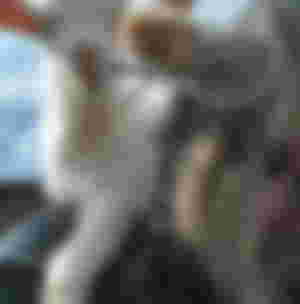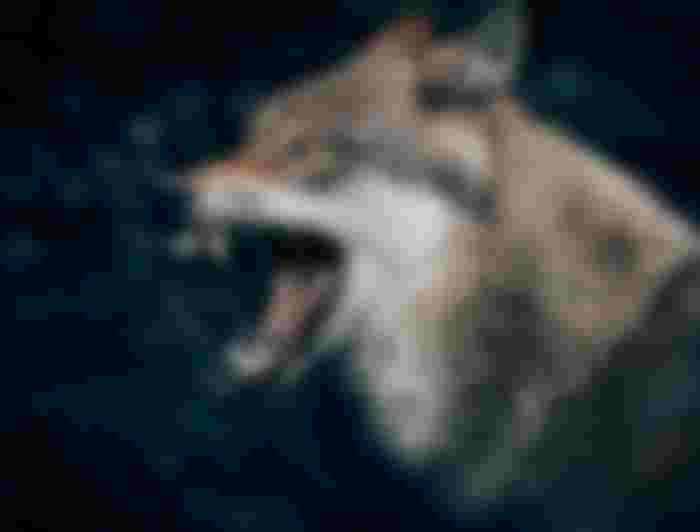
I wrote this piece for Grit Magazine Blog in 2019. J.J. is now a fully grown mama goat pictured in the lead image(she's the one in the middle). She no longer launches herself off of my back. She just steps on my feet. At around 175 pounds, that's a lot of stepped on! These days it is her little baby who, despite her three leggedness, launches herself in the air. Sometimes off of me. Sometimes off of J.J. whom I remind frequently that Karma is a bitch.
How Old is Too Old to Work?
J.J. took a running leap and launched herself off of my back. "Please don't throw out my back. Please. Please Please."
The thought swirled around my brain as I gingerly stretched my back, feeling for injury. Fortunately, this time, there was no pain, no injury to be found. I haven't always been so lucky.
J.J. is a sixty-pound dairy goat kid. She is four months old and incredibly playful. A decade ago, I would have been able to take that hit without pain or worry.
Today, I worry. Today, I hurt. My muscles are feeling the strain. I didn’t throw my back out today. But what about tomorrow? What about a decade from now?
In ten years, I will not yet be eligible for retirement benefits. I need to work many more years for that. Will my body hold out that long?
Ranching is hard work.
Operating a working sheep and goat ranch takes its toll on my body. Twice a year we run all the animals through a shoot to give them vaccines and de-wormer medication.
The sheep can be skittish and will try to escape. Sometimes, right over my head. Sometimes, right into me.
The goats are stubborn and may need encouragement to get into the working shoot. I have to pull or push 100-to 200-pound animals.
Sometimes I need to straddle an animal in order to hold it still enough to dock a tail or insert an ear tag. I hold weeks old kid bucklings and ram lambs so my husband can slip on the castration band. The boys wiggle and struggle.
During kidding and lambing season, I take on the role of midwife. Some ewes and does need help. Pulling a baby is hard work. It takes strength to pull. It takes patience. Labor can go on for quite a while. I often have to hunker down in an awkward position for half an hour or more.
I milk my dairy goats by hand. I wonder how much longer until arthritis takes away that joy.
I wonder and I worry.
How much longer will I be able to carry fifty-pound sacks of feed on my shoulder? How much longer will I be able to lower myself onto the milk stool? How much longer before I regularly forget my daily chores? Before my vision goes. Before my memory is gone.
Losing my memory is my top fear. I cared for my grandmother during her last stages of alzheimers. The slightlest little brainfart can send me into a panic. And then I remember the thing I forgot and feel relief until the next time I lose a word for something or forget the answer to the question I just asked my husband, twice.
Forgetfulness could be dangerous to my animals as well. I could forget to feed and water them. I might forget to unlock the headstall on the milk stand and leave the goat standing all day. I could forget to shut or latch the gate. The animals might get into the wrong pasture. They might walk off the property. They might be stolen.
They could die.
I worry about my eyesight failing. Many visual clues indicate herd health and safety. I wonder how much longer I will be able to look at my animals each day. I worry I will miss signs of illness or injury. I worry I won’t see that hole in the fence where a coyote can get in.

I love my job. I am not yet too old to work.
Yet, I worry and wonder.
How old is too old to work?
I don’t like to worry. I have taken steps to ensure I will be able to work as long as possible.
I love my work! I have found solutions.
The first step was to enlist help. The sheep and goat community in my area is relatively small. We tend to know each other well. I’ve befriended some younger, more physically able people who come help. They in turn have enlisted their children to help.
My job has become so much easier. I load the syringes while standing on the other side of the wall of the shoot.
Or I hold open a gate and act as a human deterrent. Not a single animal has tried to jump over or into me since I’ve enlisted help. My whole body thanks me!
As an added bonus, I get to stand around gossiping with my younger friend. Our gossip runs the gamut between tales of the sales barn to the funny things our chickens, ducks, sheep, and goats have done. The human contact alone helps keep me feeling young. My heart and soul thank me!
During lambing and kidding season, I now move soon-to-be-laboring mamas to a more accessible area. The milk barn and pen, or the corral which has shelter, or even an open pasture where I can assist without having to crawl around under a shelter that is only 3 feet off the ground. My knees thank me!
I have also stopped storing feed in cans at the back of the property. We have little sheds all over our place. One such shed is very close to the house and easily accessible through the garage. I keep bags of feed in there. It is still inaccessible to the animals, and much less of a burden to carry.
Just in case I do need to transport multiple fifty-pound bags of feed, I have a dolly and a wheelbarrow. The wheelbarrow is the easiest for me. It is one of those big square bucket things on four wheels. No bending and lifting. No balancing and wheeling. Just pulling. My back thanks me!
My arthritis isn’t getting any better. That’s the nature of the beast. I have implemented new milking strategies. I no longer milk during the early morning hours in winter, waiting until 10:00 a.m., thereby giving the sun time to warm the air. I save and freeze milk during spring, summer, and autumn to use in winter. Frozen goat milk is not pleasing to drink but makes excellent cheese. I can now have cheese all year round without hurting my knuckles. My hands thank me!
My husband has recently installed motion sensor lights. He was hoping to scare away predators. Fortunately, they work for me, too. I get out to work earlier in the morning and work longer into the evening.
If I need to see distant animals in the field or check the fence-line, I again enlist help. My husband’s eyesight is still very sharp at distance. I help him see up close. He helps me see far away. We are like Jack Sprat and his wife, but with eyesight rather than food.
Asking for Assistance is often a difficult thing for independently minded folks. Living and working way out in the country definitely means a certain measure of independence. Seeking help now means I can continue my work for many, many more years.
I have even asked for help with my memory, which by no means is gone, but may be going. I have let my people know I am I may become forgetful. I have become adept at keeping track of needed chores, birth dates, vaccination and worming schedules, and special little chores. I simply write them down.
I have a logbook for myself in addition to the book for livestock. I have reminders I can set on my phone, but I prefer good old-fashioned ink on paper. I have visual reminders when I write notes to myself on the kitchen calendar.
This was a habit I had to develop.
At first, I would forget to remember to write it down. I stuck with it and jotting down notes is now second nature. My memory thanks me!
I still wonder how old is too old to work.
I no longer worry age will slow me down any time soon.
This story was originally published in Grit Magazine Blog: Ranching With Jonica


That was a great read, I too know the worries of arthritis and caring for a mother who had vascular dementia. Not pleasant when you know it could happen to us. Out of curiosity how do you feel now, two years on from that article you wrote?